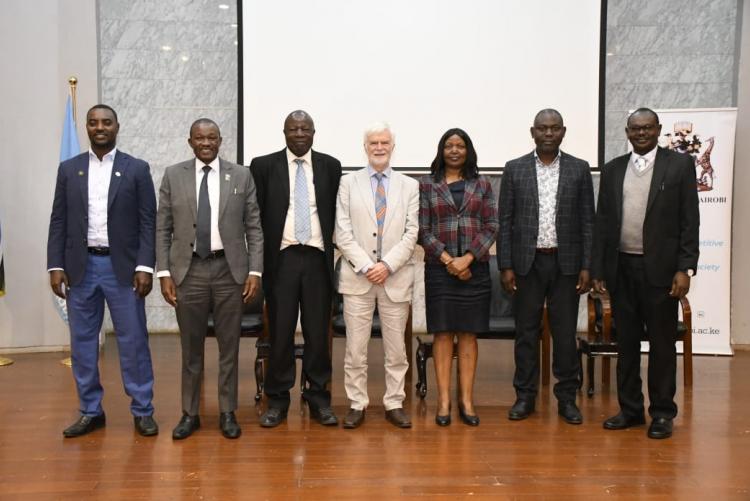Nairobi, Kenya - July 14, 2025;The Department of Earth and Climate Sciences, in collaboration with the Intergovernmental Panel on Climate Change (IPCC), hosted a landmark public lecture titled "Assessing Climate Change: Scientific Needs for Africa and Beyond." The event, led by IPCC Chair Professor Jim Skea, brought together over 200 participants including academia, government officials, early career scientists, media representatives, NGOs, and private sector stakeholders to address the urgent climate challenges facing Africa and explore pathways for enhanced scientific collaboration.
In her opening address, Vice Chancellor Professor Margaret Jesang Hutchinson, delivered by Professor Leonida Kerubo, Dean of the Faculty of Science and Technology, emphasized the gathering's significance as a pivotal moment for strengthening partnerships across multiple sectors. She highlighted the critical importance of aligning research strategies with evolving IPCC priorities, including special reports on climate change and cities, short-lived climate forcers, carbon dioxide removal technologies, and adaptation guidelines. "This forum serves as a vital platform for knowledge exchange, capacity building, and enhancing the role of universities and national researchers in informing effective climate action," Professor Hutchinson noted, underscoring the university's commitment to producing policy-relevant research that contributes to global climate solutions.
IPCC Chair Jim Skea delivered a comprehensive assessment of Africa's climate vulnerability, outlining three critical risks facing the continent due to accelerated climate change, namely biodiversity loss and economic disruption threatening ecosystems and livelihoods, increased mortality and morbidity from extreme heat and infectious diseases, and reduced food production affecting crops, fisheries, and livestock systems. Professor Skea emphasized that climate change impacts are not distant threats but present realities. "The impact of climate change is not a future concern but is here and now," he stated, noting that while human activities are the primary drivers of climate change, the most vulnerable populations are often the least responsible for emissions.
Despite the alarming climate trends, Professor Skea highlighted encouraging developments in clean energy transitions. He pointed to impressive increases in renewable energy adoption and electric vehicle systems, particularly in China, Europe, and North America, demonstrating that solutions are not only possible but actively scaling. "I don't only bring bad news in this lecture but also want to give hope and optimism from Climate Change Actions," Professor Skea remarked, citing declining renewable energy costs and scientific breakthroughs in carbon dioxide removal as reasons for cautious optimism.
A significant focus of the lecture was the persistent data and resource gap affecting the Global South, particularly Africa. Professor Skea acknowledged this challenge and outlined ongoing efforts by the IPCC, in collaboration with the World Meteorological Organization (WMO) and the United Nations Environment Programme (UNEP), to bridge this divide through incorporating indigenous knowledge systems into climate assessments, including more local experts as authors in IPCC reports, and ensuring equitable representation in working group membership. As evidence of this commitment, 11 Kenyan scientists, several from the University of Nairobi, are currently participating in IPCC working groups, representing a significant step toward more inclusive climate science.
IPCC Vice-Chair Ladislaus Chang'a issued a compelling call to action for youth and early career scientists, encouraging them to actively contribute to the IPCC's mission and help shape climate policies. He highlighted several opportunities for engagement including the IPCC scholarship program for emerging researchers, participation in IPCC report reviews, involvement in expert meetings and workshops, and increased academic publishing for peer review. "We need more voices from Africa in global climate science," Chang'a emphasized, urging academicians to increase their research output and young scientists to seize available opportunities.
The event also provided insights into the IPCC's Seventh Assessment Report (AR7), which aims to update global understanding of climate change by integrating cutting-edge scientific findings across physical science, impacts, and mitigation strategies. AR7 will place special emphasis on emerging topics including short-lived climate forcers, carbon dioxide removal technologies, and climate justice considerations. This comprehensive assessment will enhance the policy relevance of climate knowledge to support international frameworks such as the Paris Agreement and the Sustainable Development Goals, ensuring that scientific insights translate into effective climate action.
In addressing the global temperature targets, Professor Skea provided a sobering assessment: "It is more likely that global warming is going to exceed 1.5°C in the next few years. We need to be realistic and revise the 1.5°C target and put in place right policies to deal with global warming." This candid acknowledgment underscores the need for adaptive strategies and realistic policy frameworks that can effectively address the evolving climate reality while maintaining ambition for emissions reductions.
The public lecture and outreach activity, held during the 20th session of the African Ministerial Conference on Environment (AMCEN-20), represents a crucial step in building Africa's climate resilience. By fostering stronger collaboration between government, academia, research institutions, media, NGOs, and the private sector, the event laid the groundwork for more effective climate action across the continent. The University of Nairobi's hosting of this significant event reinforces its position as a leading institution in climate science education and research, while contributing to the broader goal of enhancing Africa's voice in global climate discussions and decision-making processes.
The public lecture was part of a broader outreach initiative during IPCC Chair Jim Skea's visit to Nairobi for AMCEN-20, demonstrating the continued commitment to making climate science accessible and actionable for diverse stakeholders across Africa.
- Log in to post comments

